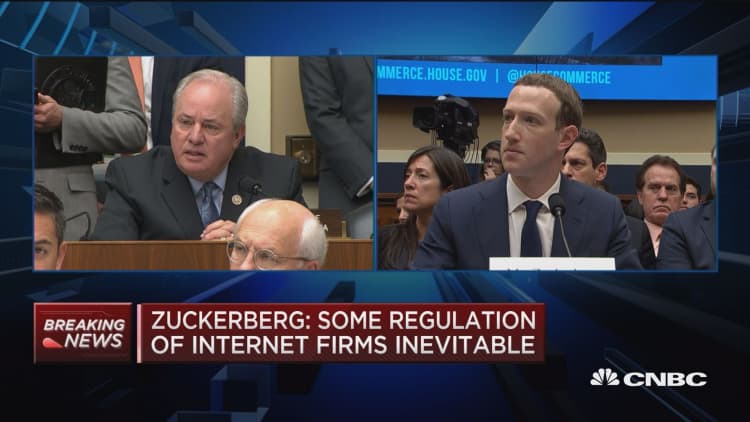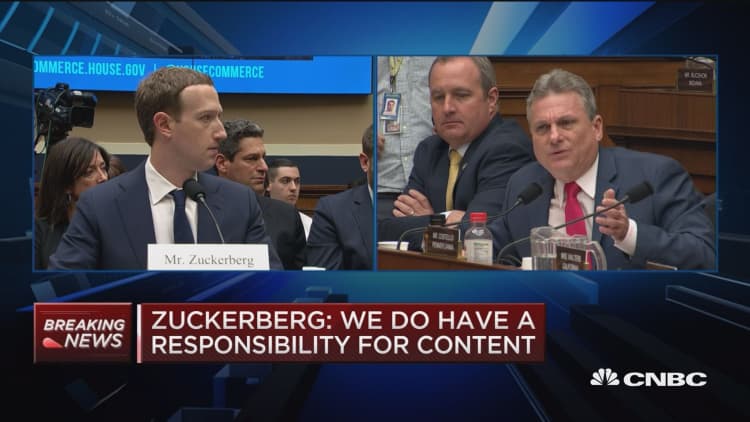
Mark Zuckerberg faced a harsher crowd Wednesday on Capitol Hill in the second day of congressional hearings for the Facebook founder and CEO.
Members of the House Energy and Commerce Committee grilled Zuckerberg for nearly five hours about his company's legal obligations, guiding principles and his own philosophies as steward of the largest social media platform in the world.
Representatives repeatedly tested Zuckerberg's knowledge of the company, questioned appropriate boundaries within which Facebook should be allowed to collect data on users, and expressed frustration that Zuckerberg — despite years of public apologies — does not appear to prioritize user protection.
"To my mind, the only way we will close the trust gap is through legislation that creates and empowers a sufficiently oversight agency with rule-making authority to protect the digital privacy and ensure that companies protect our users data," Rep. Michael Doyle, D-Pa., said during questioning. "Why should we trust you to follow through on these promises when you have demonstrated that you're willing to flaunt your internal policies and government oversight when the need suits you?"
Wednesday's hearing stood in contrast to a joint hearing of the Senate Judiciary and Commerce committees Tuesday, which frequently devolved into questions about basic Facebook functionality and its business model.
Members of the House were more prepared, with both a detailed primer and Tuesday's testimony to help them.
"Some things are striking during this conversation," Rep. Debbie Dingell, D-Mich., said during her questioning. "As CEO you didn't know some key facts. ... You didn't know how many other firms have been sold data by Dr. Kogan other than Cambridge Analytica and Eunoia Technologies, even though you were asked that question yesterday — and yes, we were all paying attention yesterday."
Facebook and its top executives are facing questions and government probes following reports that research firm Cambridge Analytica purchased the personal data of as many as 87 million Facebook users from app developer Aleksandr Kogan.
Facebook has said it first learned of the leak in 2015 and demanded Cambridge Analytica delete the data then, but has come under fire for failing to notify the public or the Federal Trade Commission before last month when a pair of news reports revealed Cambridge Analytica may still have the data in its possession.
The FTC is investigating the social media company to determine whether it violated a consent decree it signed in 2011 requiring that Facebook notify users if their personal data is shared beyond their specified privacy settings.
Facebook's history with the regulatory agency became a particular point of tension during Wednesday's hearing.
"We continue to have these abuses and these data breaches, but at the same time, it doesn't seem like future activities are prevented," Rep. Diana DeGette, D-Colo., said. "So I think one of the things that we need to look at in the future, as we work with you and others in the industry, is putting really robust penalties in place in case of improper actions."
DeGette's call for greater penalties followed a heated back-and-forth in which the congresswoman became visibly exasperated that Zuckerberg did not have more information about his company's history.
Representatives also challenged Zuckerberg on censorship of conservative information, tracking pixels that monitor non-Facebook users and Facebook users who aren't logged in, and the social media site's role in the nationwide opioid epidemic.
The Food and Drug Administration earlier this month said social media companies could do more to combat the country's worsening drug problem. CNBC found in November countless illegal listings for opioids on Facebook.
"Your platform is still being used to circumvent the law and allow people to buy highly addictive drugs without a prescription," Rep. David McKinley, R-W.Va., said. "With all due respect, Facebook is actually enabling an illegal activity, and in so doing, you are hurting people."
McKinley suggested the company has the information necessary to take down the listings, but has yet to do so.
Watch the full video of Zuckerberg's second testimony here.
— CNBC's Ingrid Angulo contributed to this report.
WATCH: 20,000 people working on FB security and content review by end of year



